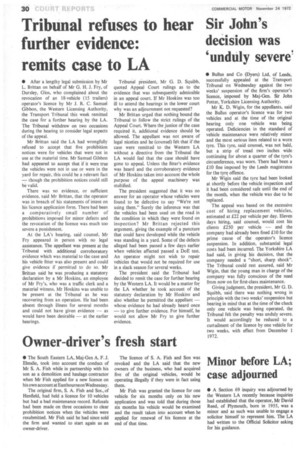• After a lengthy legal submission by Mr L. Brittan
Page 32

If you've noticed an error in this article please click here to report it so we can fix it.
on behalf of Mr G. H. J. Fry, of Dursley, Glos, who complained about the revocation of an 18-vehicle (15 trailers) operator's licence by Mr J. R. C. Samuel Gibbon, the Western Licensing Authority, the Transport Tribunal this week remitted the case for a further hearing by the LA. The Tribunal withdrew on two occasions during the hearing to consider legal aspects of the appeal.
Mr Brittan said the LA had wrongfully refused to accept that five prohibition notices were for vehicles that were not in use at the material time. Mr Samuel Gibbon had appeared to accept that if it were true • the vehicles were not in use or were in the yard for repair, this could be a relevant fact — though the prohibition notices could still be valid.
There was no evidence, or sufficient evidence, said Mr Brittan, that the operator was in breach of his statements of intent on his licence application form. There had been a comparatively small number of prohibitions imposed for minor defects and the revocation of the licence was much too severe .a punishment.
At the LA's hearing, said counsel, Mr Fry appeared in person with no legal assistance. The appellant was present at the Tribunal with additional corroboratory evidence which was material to the case and his vehicle fitter was also present and could give evidence if permitted to do so. Mr Brittan said he was producing a statutory declaration by a Mr Hoskins, an employee of Mr Fry's, who was a traffic clerk and a material witness. Mr Hoskins was unable to be present at the Tribunal as he was recovering from an operation. He had been absent through illness for several months and could not have given evidence — as would have been desirable — at the earlier hearings. Tribunal president, Mr G. D. Squibb, quoted Appeal Court rulings as to the evidence that was subsequently admissible in an appeal court. If Mr Hoskins was too ill to attend the hearings in the lower court why was an adjournment not requested?
Mr Brittan urged that nothing bound the Tribunal to follow the strict rulings of the Appeal Court. Where the justice of the case required it, additional evidence should be allowed. The appellant was not aware of legal niceties and he (counsel) felt that if the case were remitted to the Western LA without a directive from the Tribunal the LA would feel that the case should have gone to appeal. Unless the fitter's evidence was heard and the corroboratory evidence of Mr Hoskins taken into account the whole purpose of the appeal machinery was stultified.
The president suggested that it was no answer for an operator whose vehicles were found to be defective to say "We're not using them." Surely the inference was that the vehicles had been used on the road in the condition in which they were found on inspection? Mr Brittan rejected this argument, giving the example of a puncture that could have developed while the vehicle was standing in a yard. Some of the defects alleged had been passed a few days earlier when vehicles affected passed a DoE test. An operator might not wish to repair vehicles that would not be required for use in a slack season for several weeks.
The president said the Tribunal had decided to remit the case for further hearing by the Western LA. It would be a matter foT the LA whether he took account of the statutory declaration by Mr Hoskins and also whether he permitted the appellant — whose evidence he had already heard once — to give further evidence. For himself, he would not allow Mr Fry to give further evidence.












































































































